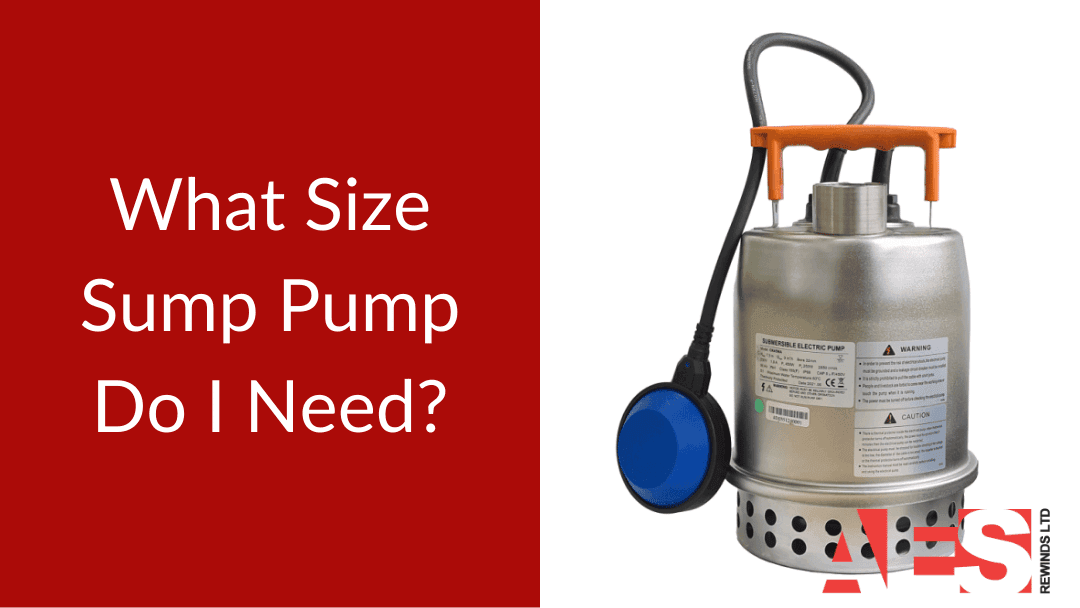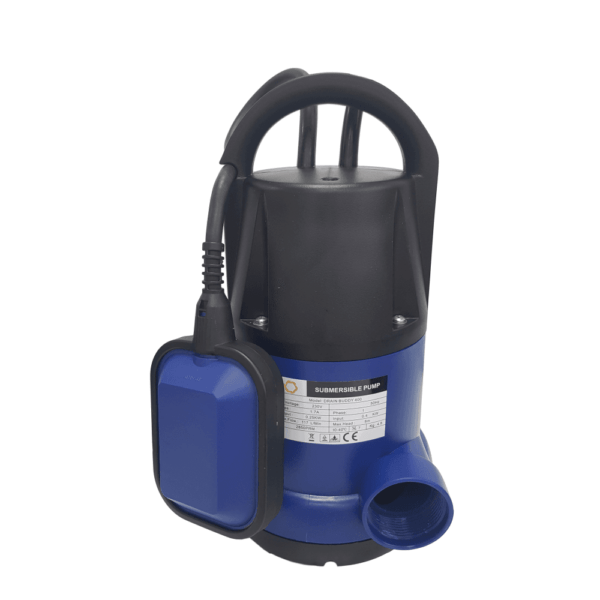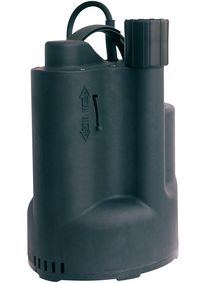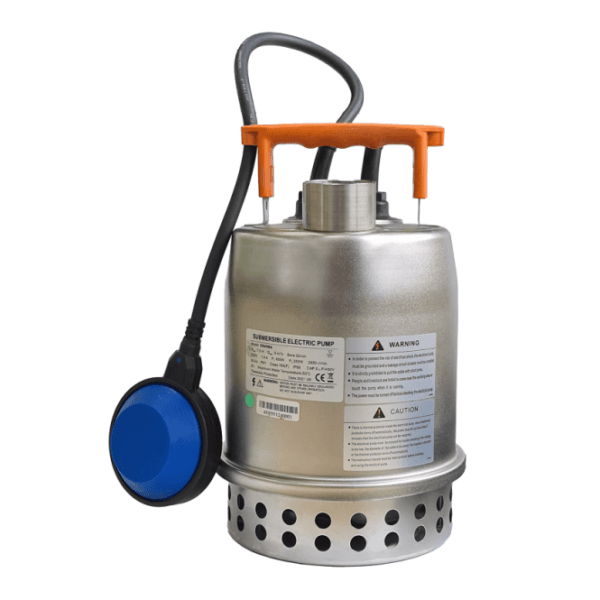Choosing the right sump pump size is crucial for protecting your basement from flooding whilst avoiding wasted money on an oversized system. Most UK homes require pumps between 0.25 and 0.4 kW, but the exact size depends on your specific basement dimensions, water table conditions, and pumping requirements.
This guide will walk you through the precise calculations needed to determine your ideal pump size, recommend specific models available at AES Rewinds, and explain when to choose submersible versus pedestal pumps for your application.
Understanding the Two Critical Measurements
Measurement 1: Flow Rate (How Much Water)
Flow rate, measured in litres per minute (L/min), determines how quickly your pump must remove water. UK homes typically require between 100-250 L/min depending on basement size and conditions.
Quick Estimation Guide:
- Small basement (under 50m²): 100-150 L/min
- Medium basement (50-100m²): 150-250 L/min
- Large basement (over 100m²): 250+ L/min
UK-Specific Factors:
- Clay soil conditions: Common across southern England, these poorly-draining soils increase water accumulation
- Regional rainfall: Areas with high rainfall intensity require higher flow rates
- Water table levels: Properties near rivers or with known flooding history need additional capacity
Measurement 2: Total Dynamic Head (How High to Pump)
Total Dynamic Head (TDH) represents the total resistance your pump must overcome, measured in metres. It comprises two components:
Static Head (Vertical Lift)
This is the vertical distance from your pump to the discharge point. Typical UK basements range from 2-4 metres below ground level, plus the height to your discharge point.
Example Calculation:
- Basement depth: 3 metres
- Height to discharge point: 1.5 metres
- Total static head: 4.5 metres
Friction Head (Pipe Resistance)
Water flowing through pipes creates friction that reduces pump efficiency. Key factors include:
- Pipe diameter: 32mm pipe creates more friction than 40mm or 50mm pipe
- Pipe length: Both horizontal and vertical runs
- Fittings: Each 90° elbow adds approximately 1 metre equivalent length
Sample Friction Calculation:
- 20 metres of 40mm pipe
- 3 × 90° elbows = 3 metres equivalent length
- 1 × check valve = 3 metres equivalent length
- Total equivalent length: 26 metres
- Estimated friction loss: 1.5 metres (for typical flow rates)
Complete TDH Example: Static head (4.5m) + Friction head (1.5m) = 6 metres Total Dynamic Head
Recommended Sump Pumps by Scenario
Scenario 1: Standard UK Terraced House Basement
Typical Requirements:
- Basement size: 30-60m²
- Clay soil conditions
- Moderate water table
- Required flow: 100-150 L/min
- Total head: 5-8 metres
Recommended Pump: Drain Buddy 400 Auto Sump Pump
Drain Buddy 400 Automatic Sump Pump
Get the Drain Buddy 400 Auto Sump Pump, a reliable and efficient budget submersible drainage pump for domestic use. Fully automatic with a pendant-style cable float switch, it has a maximum flow of 117 litres per minute and a maximum head of 8 metres. Perfect for drainage, sumps, and cellars.
- Power: 0.25 kW
- Flow rate: 117 L/min maximum
- Head: 7 metres maximum
- Features: Fully automatic with pendant-style cable float switch, 38mm outlet with stepped adapter, 10-metre power cable
This budget-friendly option provides reliable performance for most UK domestic applications.
Scenario 2: Compact Spaces with Higher Performance Needs
Typical Requirements:
- Limited sump chamber space
- Clean water applications
- Required flow: 120-140 L/min
- Total head: 6-7 metres
Recommended Pump: Pentair Flotec Compac 150
- Power: 0.3 kW
- Flow rate: 140 L/min
- Head: 7 metres maximum
- Features: Compact dimensions (170mm × 200mm footprint), integral float switch, pumps down to 3mm in manual mode
The stainless steel construction and ceramic counterface provide excellent durability, making this ideal for quality-conscious installations.
Pentair Flotec Compac 150 230v Submersible Pump
The Pentair Flotec Compac 150 230v is our most compact submersible pump, perfect for confined spaces with its modest 170mm x 200mm footprint and 280mm height. Ideal for clean water applications, this powerful unit efficiently drains flooded rooms, basements, and extracts water from wells, basins or cisterns with a maximum flow rate of 140 litres per minute and head of 7 metres.
Featuring a built-in float switch with selectable automatic or manual operation, the Compac 150 230v activates automatically when water levels reach 140mm and switches off at 30mm. In manual mode, it can reduce water levels to just 3mm. The durable polypropylene body and Noryl impeller ensure reliability whilst handling solids up to 5mm.
Complete with a check valve, 1¼” adjustable hose connector accommodating ¾”, 1″ and 1¼” hoses, and a generous 10-metre power cable, this 230v model provides exceptional versatility for domestic and light commercial applications.
Scenario 3: High Water Table or Larger Basements
Typical Requirements:
- Basement size: 60-120m²
- High water table areas
- Required flow: 200-300 L/min
- Total head: 8-15 metres
Recommended Pump: CK 100MA
- Power: 0.75 kW
- Flow rate: 275 L/min maximum
- Head: 15 metres maximum
- Features: Stainless steel construction, dual mechanical seals, suitable for clean and dirty water
This heavy-duty pump offers exceptional reliability for demanding applications and provides 25% more capacity than smaller pumps.
Oreal CK Stainless Steel Sump Pump CK100M
The Oreal CK100MA is a high-performance submersible centrifugal drainage pump engineered for demanding drainage and circulation duties. This powerful model delivers an exceptional 275 litres per hour at 15 metres head while maintaining excellent energy efficiency at 0.75 kW. Constructed with premium stainless steel AISI304 components for all water-contact parts, the CK100MA features a 1 1/2″ outlet, 10 metres of power cable, and twin mechanical seals housed in a lubricated chamber. Capable of handling solids up to 10mm and operating in liquid temperatures up to 50°C, this versatile pump excels in clean, black, and dirty water applications with a maximum submersion depth of 5 metres.
Scenario 4: Commercial or Very Large Basement
Typical Requirements:
- Basement size: Over 120m²
- Multiple water sources
- Required flow: 300+ L/min
- Total head: 10-15 metres
Recommended Pump: JS 750 Submersible Pump
- Power: Higher capacity (contact AES Rewinds for specifications)
- Flow rate: 400 L/min
- Head: 15 metres maximum
- Features: Heavy-duty construction, available in 2″ or 3″ outlet options
For critical applications, consider dual pump systems for redundancy.
Power Rating Guide and Performance
0.25 kW Pumps (Budget Range)
- Maximum head: 7-8 metres
- Flow rate: 100-120 L/min
- Best for: Small basements, standard conditions
- Example: Drain Buddy 400 – budget-priced yet reliable for domestic use
0.3 kW Pumps (Compact Performance)
- Maximum head: 7-10 metres
- Flow rate: 140-150 L/min
- Best for: Limited space installations requiring quality construction
- Example: Pentair Flotec Compac 150 with stainless steel motor housing
0.75 kW Pumps (Heavy Duty)
- Maximum head: 10-12 metres
- Flow rate: 240-250 L/min
- Best for: High water table areas, larger basements
- Example: CK100M
Submersible vs Pedestal: Which Type to Choose
Submersible Pumps (Recommended for Most Applications)
Advantages:
- Quiet operation: Ideal for habitable basements as they operate underwater
- Space-saving: Compact units like the Flotec Compac fit in tight spaces
- Higher performance: More powerful motors available
- Longer lifespan: Water cooling extends motor life
Available at AES Rewinds:
- Drain Buddy 400: Budget-friendly automatic operation
- Pentair Flotec Compac 150: Premium compact design
- Sump Buddy: Built-in sliding float switch for space-limited applications
Pedestal Pumps
Advantages:
- Lower initial cost
- Easier maintenance access
- Motor stays dry
Best for: Utility areas where noise isn’t a concern and budget is the primary consideration.
Step-by-Step Sizing Process
Step 1: Measure Your Basement
- Calculate floor area: Length × Width (m²)
- Measure depth below ground level
- Identify lowest point for pump placement
- Measure distance to suitable discharge location
Step 2: Calculate Required Flow Rate
Basic Formula: Basement area ÷ 2 = Base flow requirement (L/min) Add 30% safety margin for peak conditions
Example:
- 60m² basement ÷ 2 = 30 L/min base
- Add 30% safety margin = 39 L/min
- Minimum required: 130 L/min (accounting for UK conditions)
Step 3: Calculate Total Dynamic Head
Static Head: Basement depth + discharge height above ground Friction Head: Use pipe manufacturer’s charts or consult AES Rewinds Total: Add static and friction heads together
Step 4: Match Pump to Requirements
Compare your calculations against pump performance curves:
- Drain Buddy 400: Up to 117 L/min at 8m head
- Flotec Compac 150: Up to 140 L/min at 7m head
- JS 400: Up to 240 L/min at 12m head
Step 5: Consider Additional Features
- Automatic operation: All recommended pumps include float switches for hands-free operation
- Backup systems: Consider dual pump setups for critical applications
- Alarm systems: High water level alarms provide early warning
When You Need Professional Sizing
Complex Situations
- Multiple water sources (groundwater and surface water)
- Unusual basement layouts with multiple levels
- Commercial or industrial applications
- Heritage buildings requiring specialist expertise
Warning Signs of Incorrect Sizing
Undersized Pump:
- Continuous operation during heavy rain
- Water level rises faster than pump removal rate
- Basement flooding despite pump operation
Oversized Pump:
- Frequent on/off cycling (short cycling)
- Pump runs for only seconds at a time
- Premature pump failure
Buying Considerations and Next Steps
Key Specifications to Compare
- Power rating (kW): Match to your calculated requirements
- Flow rate and head performance: Check manufacturer curves
- Build quality: Stainless steel construction offers superior durability
- UK electrical compatibility: All recommended pumps operate on 230V single-phase
Installation Requirements
- Professional installation recommended for new systems to ensure Building Regulations compliance
- DIY possible for direct pump replacements only
- Electrical work must comply with Part P regulations
Visit AES Rewinds’ online shop to browse the complete range of Sump Pumps, or contact their experienced team for personalised recommendations. With over 60 years of pump expertise and comprehensive UK coverage, AES Rewinds ensures you get the right pump for your specific requirements.
This guide provides general sizing recommendations. For complex installations or critical applications, contact AES Rewinds today for advice




